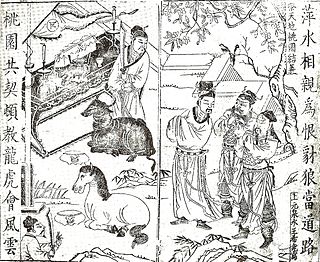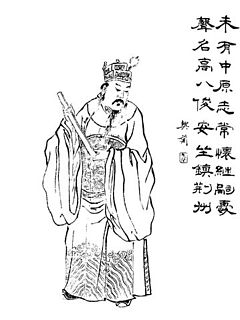
The Three Kingdoms from 220–280 AD was the tripartite division of China among the states of Wei, Shu, and Wu. It started with the end of the Han dynasty and was followed by the Jin dynasty. The term "Three Kingdoms" is something of a misnomer, since each state was eventually headed not by a king, but by an emperor who claimed suzerainty over all China. Nevertheless, the term "Three Kingdoms" has become standard among English-speaking sinologists. To distinguish the three states from other historical Chinese states of the same names, historians have added a relevant character to the state's original name: the state that called itself Wei (魏) is also known as Cao Wei (曹魏), the state that called itself Han (漢) is also known as Shu Han (蜀漢) or just Shu (蜀), and the state that called itself Wu (吳) is also known as Eastern Wu or Sun Wu (孫吳).

Sun Quan, courtesy name Zhongmou, formally known as Emperor Da of Wu, was the founder of the state of Eastern Wu during the Three Kingdoms period. He inherited control of the warlord regime established by his elder brother, Sun Ce, in 200. He declared formal independence and ruled from 222 to 229 as the King of Wu and from 229 to 252 as the Emperor of Wu. Unlike his rivals Cao Cao and Liu Bei, Sun Quan was much younger than they were and governed his state mostly separate of politics and ideology. He is sometimes portrayed as neutral considering he adopted a flexible foreign policy between his two rivals with the goal of pursuing the greatest interests for the country.

Romance of the Three Kingdoms is a 14th-century historical novel attributed to Luo Guanzhong. It is set in the turbulent years towards the end of the Han dynasty and the Three Kingdoms period in Chinese history, starting in 169 AD and ending with the reunification of the land in 280.

Liu Bei, courtesy name Xuande, was a warlord in the late Eastern Han dynasty who founded the state of Shu Han in the Three Kingdoms period and became its first ruler. Despite early failings compared to his rivals and lacking both the material resources and social status they commanded, he gathered support among disheartened Han loyalists who opposed Cao Cao, the warlord who controlled the Han central government and the figurehead Emperor Xian, and led a popular movement to restore the Han dynasty through this support. Liu Bei overcame his many defeats to carve out his own realm, which at its peak spanned present-day Sichuan, Chongqing, Guizhou, Hunan, and parts of Hubei and Gansu.

Zhuge Liang, courtesy name Kongming, was a Chinese politician, military strategist, writer, engineer and inventor. He served as the chancellor and regent of the state of Shu Han during the Three Kingdoms period. He is recognised as the most accomplished strategist of his era, and has been compared to Sun Tzu, the author of The Art of War. His reputation as an intelligent and learned scholar grew even while he was living in relative seclusion, earning him the nickname "Wolong" or "Fulong", meaning "Crouching Dragon" or "Sleeping Dragon". Zhuge Liang is often depicted wearing a Taoist robe and holding a hand fan made of crane feathers.

Han, known in historiography as Shu Han or Ji Han (季漢), was one of the three major states that competed for supremacy over China in the Three Kingdoms period (220–280). The state was based in the area around present-day Sichuan and Chongqing, which was historically known as "Shu" after an earlier state in Sichuan named Shu. Shu Han's founder Liu Bei had named his state "Han" as he considered it the legitimate successor to the Han dynasty, while "Shu" is added to the name as a geographical prefix to differentiate it from the many "Han" states throughout Chinese history.

Liu Biao (142–208), courtesy name Jingsheng, was a government official and warlord who lived in the late Eastern Han dynasty of China. He is best known for serving as the Governor of Jing Province from 192 until his death in 208. He was also a member of the extended family of the Han emperors through his ancestor Liu Yu, the fifth son of Emperor Jing. Liu Biao was described as a handsome man and was over eight chi tall.
The Five Tiger Generals is a popular appellation in Chinese culture for the top five military commanders serving under one lord. Although the term does not appear in Chinese historical records and is not used officially, it has been heavily used in literature texts, folklore, as well as popular culture.

Huang Zhong, courtesy name Hansheng, was a military general serving under the warlord Liu Bei during the late Eastern Han dynasty of China. He is best known for his victory at the Battle of Mount Dingjun in 219, in which his force routed that of an enemy general, Xiahou Yuan, who was killed in action during the raid.

Liao Hua, courtesy name Yuanjian, originally named Liao Chun, was a military general of the state of Shu Han during the Three Kingdoms period of China.

Liu Shan (207–271), courtesy name Gongsi, was the second and last emperor of the state of Shu Han during the Three Kingdoms period. As he ascended the throne at the age of 16, Liu Shan was entrusted to the care of the Chancellor Zhuge Liang and Imperial Secretariat Li Yan. His reign of 40 years was the longest of all in the Three Kingdoms era. During Liu Shan's reign, many campaigns were led against the rival state of Cao Wei, primarily by Zhuge Liang and his successor Jiang Wei, but to little avail. Liu Shan eventually surrendered to Wei in 263 after Deng Ai led a surprise attack on the Shu capital Chengdu. He was quickly relocated to Luoyang, capital of Wei, and enfeoffed as "Duke Anle". There he enjoyed his last years peacefully before dying, most probably of natural causes, in 271.

The military history of the Three Kingdoms period encompasses roughly a century's worth of prolonged warfare and disorder. After the assassination of General-in-chief He Jin in September 189, the administrative structures of the Han government became increasingly irrelevant. By the time of death of Cao Cao, the most successful warlord of North China, in 220, the Han empire was divided between the three rival states of Cao Wei, Shu Han and Eastern Wu. Due to the ensuing turmoil, the competing powers of the Three Kingdoms era found no shortage of willing recruits for their armies, although press-ganging as well as forcible enlistment of prisoners from defeated armies still occurred. Following four centuries of rule under the Han dynasty, the Three Kingdoms brought about a new era of conflict in China that shifted institutions in favor of a more permanent and selective system of military recruitment. This ultimately included the creation of a hereditary military class as well as increasing reliance on non-Chinese cavalry forces and the end of universal conscription.

Meng Da, courtesy name Zidu, was a military general of the state of Cao Wei during the early Three Kingdoms period of China. He previously served the warlords Liu Zhang and Liu Bei during the late Eastern Han dynasty before defecting to Wei. In Wei, he served under the first two rulers, Cao Pi and Cao Rui. Around late 227, he started a rebellion in Wei and aimed to rejoin the Shu-Han but the revolt was swiftly suppressed by the Wei general Sima Yi. Meng Da was captured and executed for treason.
Liu Feng was an adopted son of Liu Bei, a warlord who lived in the late Eastern Han dynasty and founded the state of Shu Han in the Three Kingdoms period of China. He traced his lineage to a certain marquis whose family name was "Kou" (寇). He was also related to the House of Liu – the imperial clan of the Han dynasty from which Liu Bei descended – albeit not directly. He served as a general in his adoptive father's military forces.
Li Yan, courtesy name Zhengfang, also known as Li Ping, was a military general of the state of Shu Han during the Three Kingdoms period of China. He climbed to the zenith of his career when he was asked by the Shu emperor Liu Bei to be the military paramountcy and co-regent alongside Zhuge Liang for his son and successor, Liu Shan. After the death of Liu Bei, Li Yan was given the rank of General of the Vanguard which was last held by Guan Yu back in 220. Li served most of his career in the mid and late 220s as the area commander for the Eastern Front centered in Yong An with Chen Dao as his deputy; he never faced any major battles in his position. However, during the 230s and the 4th of Zhuge Liang's Northern Expeditions, Li Yan was given a higher rank of General of the Agile Cavalry, below only Zhuge Liang. He was assigned to handle logistics, but he was unable to deliver supplies to Zhuge Liang's army in a timely manner. After his attempt to fraudulently cover his inability to follow commands, Li Yan was stripped from positions and power.

The end of the Han dynasty refers to the period of Chinese history from 189 to 220 AD, which roughly coincides with the tumultuous reign of the Han dynasty's last ruler, Emperor Xian. During this period, the country was thrown into turmoil by the Yellow Turban Rebellion (184–205). Meanwhile, the Han Empire's institutions were destroyed by the warlord Dong Zhuo, and fractured into regional regimes ruled by various warlords, some of whom were nobles and officials of the Han imperial court. Eventually, one of those warlords, Cao Cao, was able to gradually reunify the empire, ostensibly under Emperor Xian's rule, but the empire was actually controlled by Cao Cao himself.

The Chu Shi Biao may refer to either of two memorials written by Zhuge Liang, the Imperial Chancellor of the state of Shu during the Three Kingdoms period of China. He presented them to Liu Shan, the second emperor of Shu. The first Chu Shi Biao, which is referred to as the "Former Chu Shi Biao", was presented in 227 before Zhuge Liang embarked on the first of a series of military campaigns against Shu's rival state, Wei. The second, known as the "Later Chu Shi Biao", was supposedly submitted in 228 before Zhuge Liang left for the second Northern Expedition.

Romance of the Three Kingdoms is a Chinese television series adapted from the classical novel of the same title by Luo Guanzhong. The series was produced by China Central Television (CCTV) and was first aired on the network in 1994. It spanned a total of 84 episodes, each approximately 45 minutes long. One of the most expensive television series produced at the time, the project was completed over four years and involved over 400,000 cast and crew members, including divisions of the People's Liberation Army from the Beijing, Nanjing and Chengdu military regions. Some of the dialogues spoken by characters were adapted directly from the novel. Extensive battle scenes, such as the battles of Guandu, Red Cliffs and Xiaoting, were also live-acted.














